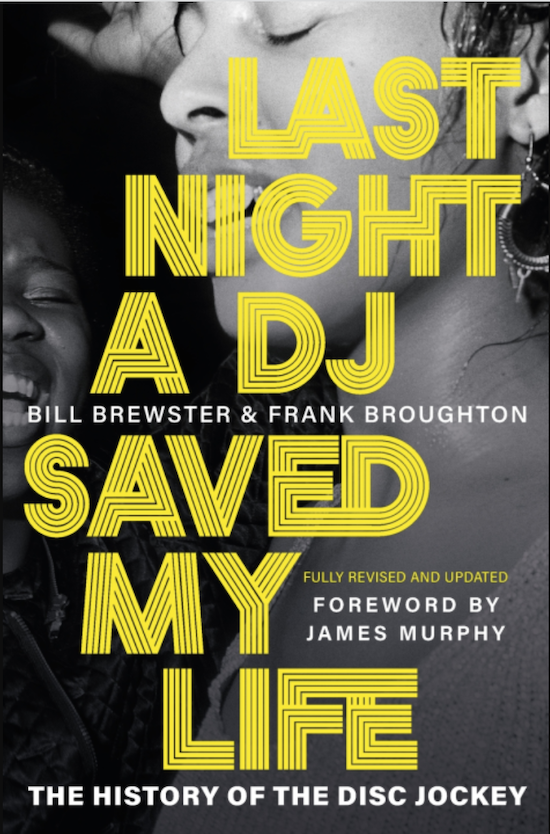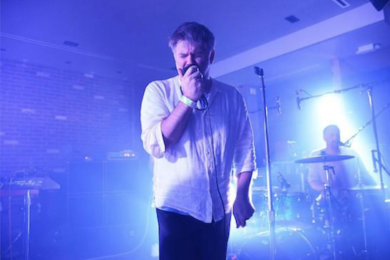White Rabbit’s hardback, audio and ebook reprint of Bill Brewster and Frank Broughton’s essential history of the disc jockey, Last Night A DJ Saved My Life, is out this week.
Below is an exclusive look at the foreword by James Murphy of LCD Soundsystem.
In 1999, the original publication of the book you’re holding in your hot little hands came out, and I read it. This thing completely unmoored me at a time when I was already staggered by a combination of MDMA, new experiences, new friends, new fun, and piles upon piles of amazing new (to me) music, pouring in from all sides, landing in my sleep-deprived lap, bewildering me. To be clear, I did not, before this time, like dance music. Or DJs for that matter. DJs, I opined, made money just playing other people’s records. My whole life, I went to see bands. More specifically, small, independent bands in little clubs. See them play live music in front of me, give up something of themselves. Leave it there on the floor. Open up and bleed. I played in meh versions of said bands. Mashed my sad little guitar into sad little mic stands with ‘feeling’, until the fretboard was all dented. Drummed as furiously as my not-so-little arms and legs could manage until I threw up into the cardboard box the nice promoter lady quickly pitched next to my hi-hat stand. No, the DJ was not for me. But the millennium was ending, my ’80s a memory; my ’90s thankfully plunging, already dead, into quicksand, and I
was, unbeknownst to me, getting ready for something else.
In about 1997, I made friends with a DJ, Marcus Lambkin (later, aka Shit Robot), and started ambling to his parties to, you know, ‘show support’ – or maybe to do something other than play pinball over cheap beer next to the indie rock jukebox in some East Village rock bar with my embittered musician buds.
Though I mainly wore NEU! shirts and feigned boredom, once Marcus started playing, I could tell something changed in the room. It was instantly more fun. I knew none of the music he or anyone else was playing, but I could tell that the party was, in that moment, better. And that was probably the first crack in my resistance …
When Marcus’s friend, the DJ David Holmes, showed up in NYC to make a record at my studio with Tim Goldsworthy and Phil Mossman (LCD’s original guitarist!), I was fully stuffed face first into a world that I had long assumed would be idiotic. I was, instead, suddenly, and against my better judgement, beginning to have fun – actual fun. I remember clearly wandering downstairs to the basement at Vanity in Manhattan, hearing David playing ‘Crosstown Traffic’ by Jimi Hendrix wafting up from his wilfully weird little party and thinking, ‘This is something a DJ is allowed play?’ It wasn’t long before I started looking sideways at the giant pile of music I had amassed over the years, wondering if there were any records in there that I could pull off playing at a party of my own. There were, indeed, many, and some simulation of a DJ Career was born.
Embarrassing as it is to admit, I was soon pretty proud of
myself. I mean, people actually started to show up and dance while my idiot friends and I played krautrock and post-punk records next to acid house and the Patrick Cowley mix of ‘I Feel Love’. I thought we were rewriting the rules, breaking tradition with all the DJs who had come before us. We were these serious record nerds! Playing these weird, personal and beloved tracks
dance floor accustomed to, well, Late-Nineties Dance Music! Look out, world!
And then I read this book. It’s hard to explain the effect it had on me. I went, quickly, from thinking we were renegade geniuses,
instead, lucky to accidentally find ourselves part of a long and beautiful tradition of evangelists, hosts, caretakers, maniacs, etc., whose job was more about making a place for the people who were willing to come listen and dance than it was about, well … us. So, this here book quickly and firmly disabused me of any egotistical DJ notions I might have been harbouring, and changed my life for the better.
It was a miraculous and humbling gift to read about Francis Grasso, playing records for fourteen hours straight at the Haven, just steps from my first apartment in The Village. Or Mancuso, the Herc/Bambaataa battles, Ron Hardy, Deep Space Soundworks … To read about Larry Levan’s uncompromising vision and work with the Paradise Garage sound system … I had been a sound engineer for years. It was my living. I was obsessed with making things hit you just right – so loud you had that fear response, but never hurting your ears. Just deep. It was so strange to find this kinship and inspiration in a world to which I had never given much thought.
This book also taught me something new about the universality of feeling – the body feeling that I was always chasing. It taught me that there were tribes upon tribes, as in awe of music as I ever was, throwing themselves into it with love and weird, blind fury. Even though I had dug for records, traded tapes, followed bands, searched in the pre-internet emptiness for a vinyl copy of the first Suicide LP, I had somehow remained completely blind to this history.
I’m now deeply grateful for this history. And I’m also really, really thankful for the playlists in the back of this book. (I’m pretty sure Charlie Grappone over at the old Vinylmania store is also happy Bill and Frank included those charts, since I pretty much spent all my money there over the ensuing decade, finding records like some weird disco archaeologist, climbing around in the Etruscan dust to score an original pressing of Sylvester’s ‘Over and Over’ – which I then proceeded to cane for, well, the rest of my life. If you ever bother to hear me DJ, and I play that, know that I’m having a great night.)
I know that now, with information at everyone’s fingertips, people feel like they know all they need to know about everything in music. But I think it’s important to understand the power of stories, and this book is an excellent place to either begin or deepen one’s investigation into the chronicles of this most hilarious, maligned, lauded, ridiculous and beautiful human from our planet’s musical lexicon: the DJ.

Last Night A DJ Saved My Life is out now in hardback on White Rabbit



